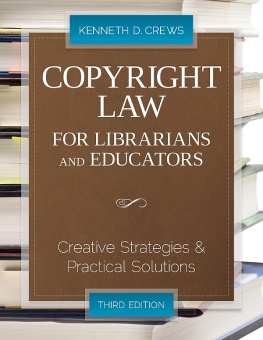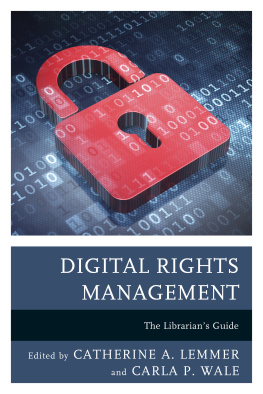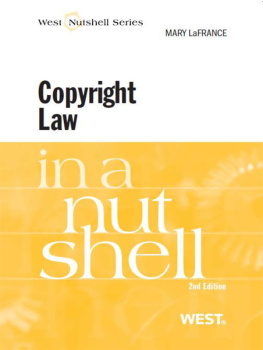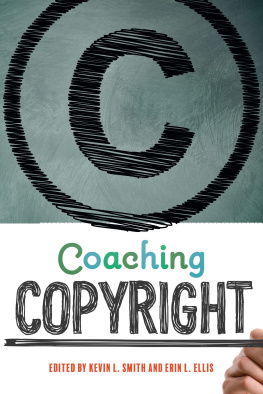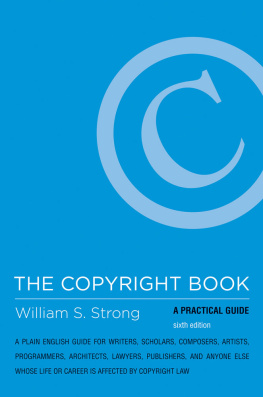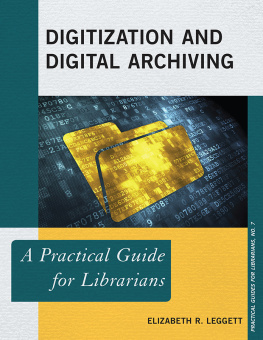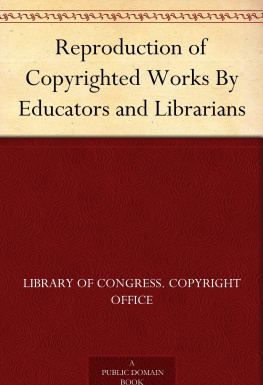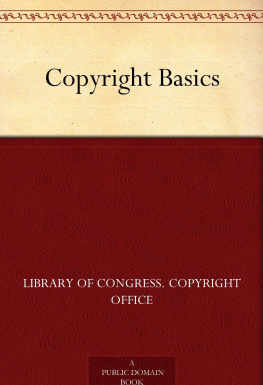Copyright Law for Librarians and Educators
ALA Editions purchases fund advocacy, awareness, and accreditation programs for library professionals worldwide.
Copyright Law for Librarians and Educators
Creative Strategies and Practical Solutions
Third Edition
Kenneth D. Crews
American Library Association | Chicago 2012
In fond memory of Mary Jane Frisby,
19662010, superb student, extraordinary friend, outstanding lawyer,
and essential contributor to the original edition of this book
Kenneth D. Crews has specialized in copyright issues as they relate to education, libraries, and research for more than twenty-five years. He directs the Copyright Advisory Office at Columbia University and teaches in the Columbia Law School. After studying history at Northwestern and law at Washington University, he earned a PhD in library and information science at UCLA. Dr. Crews has been a professor of law, library science, and business, and he held a named professorship in law at Indiana University. At Indiana he established the first office in the country specifically addressing copyright policy issues at universities. His services have been called upon by numerous colleges and universities, and by the U.S. State Department and the World Intellectual Property Organization. Kenneth Crews was the first recipient of the Ray Patterson Award from the American Library Association. He enjoys international and outdoor adventure with his family.
2012 by Kenneth D. Crews. Any claim of copyright is subject to applicable limitations and exceptions, such as rights of fair use and library copying pursuant to Sections 107 and 108 of the U.S. Copyright Act. No copyright is claimed for content in the public domain, such as works of the U.S. government. All photographs are by the author except where indicated otherwise.
Extensive effort has gone into ensuring the reliability of the information in this book; however, the publisher makes no warranty, express or implied, with respect to the material contained herein.
ISBNs: 978-0-8389-1092-4 (paper); 978-0-8389-9407-8 (PDF); 978-0-8389-9462-7 (ePub); 978-0-8389-9463-4 (Kindle). For more information on digital formats, visit the ALA Store at alastore.ala.org and select eEditions.
Library of Congress Cataloging-in-Publication Data
Crews, Kenneth D.
Copyright law for librarians and educators: creative strategies and practical solutions / Kenneth D. Crews. -- 3rd ed.
p. cm.
Includes bibliographical references and index.
ISBN 978-0-8389-1092-4 (alk. paper)
1. Copyright--United States. 2. Fair use (Copyright)--United States. 3. Librarians--United States--Handbooks, manuals, etc. 4. Teachers--United States--Handbooks, manuals, etc. I. Title.
KF2995.C74 2012
346.7304'8202402--dc23
2011027604
Cover design by Casey Bayer.
Book design by Casey Bayer and Karen Sheets de Gracia in Liberation Serif and Din.
Contents
THIS BOOK IS a full reevaluation and update of the second edition. In many places, the law has changed. In other places, the explanations are reconsidered and improved. In yet other instances, I have evaluated anew some of my own views and interpretations of the law. I am grateful to several colleagues and research assistants who contributed importantly to this edition. Dwayne K. Buttler, who holds the scholarly communications chair at the University of Louisville, has been a part of this project since the first edition, and I continue to value his judgment and crucial contributions. I have had the support of some excellent students from Columbia Law School who have worked closely with me to undertake research tasks and to respond critically and constructively to every word I wrote. Meghan Schubmehl and Sarah Burghart (both in the J.D. class of 2010) became the essential support team. Meghan was invaluable in organizing and planning each step of the project through to completion. She and Sarah spent many hours around the table with me scrutinizing each chapter and rethinking every detail.
Many others here at Columbia University have been instrumental. Columbia students Michelle Choe and Kreg Katoski contributed their diligence and wisdom. I have learned much from my colleagues throughout the university with whom I share ordeals about copyright policies, fair use, and publication agreements. I thank them all. Special thanks are due to Jim Neal and Patricia Renfro of the Columbia University Libraries, who have patiently understood the sometimes wild array of projects on my desk. Although this edition is a full revision, I would be remiss if I overlooked the continued influence of some of the colleagues who worked on the previous editions, notably Jacque M. Ramos, Megan M. Mulford, and Joshua S. Sullivan. Elizabeth St. Clair Crews, anchor of my family life, has kept me going and provided unwavering support even when my life sometimes seemed over the limits. I give deep thanks to the hundreds of professional colleagues throughout the country and the world who have invited me to their campuses and have indulged me with questions that test the reach and meaning of copyright law.
This book is dedicated to the memory of Mary Jane Frisby. Mary Jane was one of my best students, and she took an immediate interest in copyright law. She sat in the front row of the class, rose to the top, and wrote her law review paper on music downloads at a time when those issues were just beginning to surface. Mary Jane was a vital part of the original Online Copyright Tutorial way back in the 1990s that evolved into the first edition of this book. She became a star in the Indianapolis legal community. Her passing was abrupt and tragic, but friends and family will always share the memories and love of Mary Jane Frisby.
This Book and the Importance of Copyright
THE ADVANCEMENT OF innovative education, librarianship, and scholarship has become increasingly entangled with copyright law. Creative uses of protected works and new applications of digital technologies have roused complex questions about the appropriate uses of copyrighted works as well as the ownership and management of the legal rights. As we strive to better understand the issues, we are seeing steady transformation of our efforts, as well as incremental change in the law. Since the previous edition of this book, courts have handed down new rulings on many issues, including fair use and digital rights management. Congress, on the other hand, has confronted difficult issuessuch as the use of orphan worksbut has largely failed to pass major legislation directly centered on the challenges confronted by educators, librarians, researchers, and others. Meanwhile, research and education seem to be routinely reinvented with the creation of new software and technological devices.
This mix of change and inactivity has motivated private parties to take the lead in shaping some implications of copyright law. Creative Commons has become a salient point of rebellion against expanding rights. The open access movement calls for sharing rights of use. Institutional policies and agreements clarify rights of ownership and works made for hire. Educators and librarians steadily grapple with the need to define a standard for fair use. The proposed settlement of the Google Books litigation would establish its own regime of rules for creating a digital collection of copyrighted materials, although the settlement remains as of this writing under ongoing public and judicial scrutiny. Library acquisitions are shifting steadily toward electronic resources that are acquired under license agreements that define the terms of use of the journals, books, and many other works in the licensed collections. Textbooks and other instructional materials are now freely available online and reconceived as wikis and downloads. Such private agreements and pursuits are becoming a dominant force on the shape of legal rights and responsibilities.
Next page
